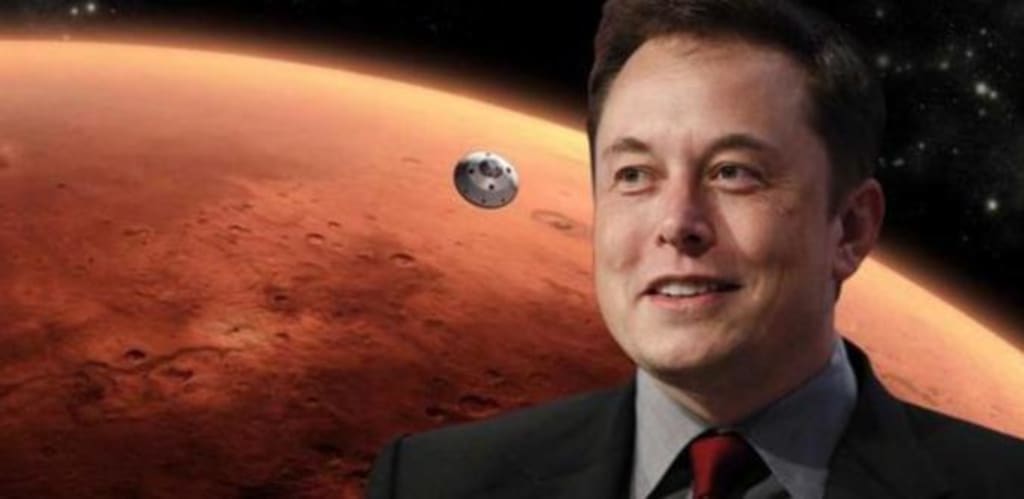Musk accelerates Mars immigration plan and says: It is honorable for the first inhabitants to sacrifice on Mars
It is honorable that the first inhabitants died on Mars

Some time ago, Elon Musk, CEO of Space Exploration Technology, once again made a surprising statement in an interview. He said that on the first human journey to Mars, we must be prepared for sacrifice. Death is inevitable, and It will be a glorious adventure, although sacrificed, but the name can go down in history forever. But is the risk really worth it?
First Martian inhabitants prepare to sacrifice
Musk said that although everyone knows that the first group to go to Mars will never come back, there are still millions of people who want to be the first group of adventurers.
Because the environment on Mars is very different from Earth, it also means that from the beginning, the journey to Mars will not be easy and enjoyable, not only will you not eat well, live well, and may even die soon after arriving, however, , it's still worth it because it's Mars.
I have to say that Musk really has a strong obsession with Mars, and he started planning for Mars immigration many years ago. You know, at that time, even NASA did not decide when it would be carried out. The first manned landing on Mars.
In a previous interview, Musk also said that he would send the first residents to Mars around 2026. This time, Musk also reiterated this plan, saying that it will not exceed 2030 at the latest.
Some people may think that the first group of Martian residents will not actually be rich people, but poor volunteers who dedicate themselves to the future "rich immigrants". After all, they are doomed to never return.
However, Musk does not think so. Musk said that everything is for all human beings, and he himself intends to become the first batch of Mars residents. In Musk's words: Born on Earth and dying on Mars, is a a very cool thing.
Not only Musk, many people now hope to go to Mars as soon as possible. Alfredo Muz, the founder of the national architectural design studio Abibu, also said some time ago that he will start Mars in 2054. The city construction plan, if all goes well, in 2100, a Martian city that can accommodate 250,000 people will be officially completed.
Similar plans include the UAE’s “2117 Mars Dubai” plan, which, in simple terms, is to build a new Dubai that can accommodate 500,000 people on Mars by 2117.
But while everyone seems to be well-planned and confident, here's the question: Can humanity really succeed? Can we really immigrate to Mars?
Is it really possible to colonize Mars?
In the eyes of scientists, Mars immigration is not easy, why do you say that? Because Mars needs to be transformed into a "Second Earth", whether it is the climate environment or the ecological environment, it is necessary to completely simulate the Earth, and this is not easy. To put it more bluntly, human beings want to transform Mars, in fact It is equivalent to playing the role of "creator".
Regardless of whether Mars in the past had a habitable period or not, for Mars at the current stage, it is a "dead" planet, and the transformation of Mars by humans is also equivalent to "resurrection" of Mars.
The first step in the transformation of Mars needs to make Mars warm. In short, it is to create greenhouse gases on Mars. Although the development of human industry has caused a greenhouse effect on the earth, this is not easy to achieve on Mars. , Because the surface temperature of Mars is now minus 63 degrees Celsius, what is the concept?
If humans want to make Mars habitable, they need to increase the surface temperature of Mars by at least 70-80 degrees Celsius. You must know that in the past 200 years, humans have only increased the average temperature of the earth by about 1 degree Celsius. , Obviously, it is extremely difficult to make Mars reach a habitable temperature.
Even if the first step is completed, it is necessary to let Mars simulate the ecological environment of the earth. At this time, it is necessary to send some creatures with strong survivability on the earth to Mars, and then gradually let Mars have biodiversity.
Finally, it is the stage when humans reach Mars. Of course, before that, humans still need to improve various facilities and build a home suitable for human habitation in advance.
How long does the whole process take? The most optimistic point of view is about 900-1000 years, and if many things are considered, it may take thousands of years, or even longer.
Of course, there is another possibility: humans will never be able to transform Mars, and naturally, humans will not be able to achieve Mars immigration.
Let's think about the question at the beginning: Is Musk's so-called "sacrifice" really worth it? Although the wish of human beings is the stars and the sea, do they really need to exchange the lives of many people? What do you think of it? Welcome to leave a message and share with us!
About the Creator
nally norris
Science needs fantasy, invention is expensive






Comments (1)
As anyone can read in my articles, Elon Musk's Losing Bet, My Open letter To Mr. Musk, or my most recent, Dear Elon Musk: Consider Yourself CHALLENGED To A Classic Race...(all here on the Vocal.Media platform) I don't think settling Mars is a worthwhile goal when we are now perhaps one step away from a breakthrough that would allow time travel to the distant past and at a fraction of the cost and massive riches to be made by doing so. Literally, $100,000 or less stands between that breakthrough and Humanity being stuck with the only option for survival being interplanetary and time is running out. Just ask the climate crisis folks or the ones fearing Putin's war ambitions. So the choice is very clear - what would you rather do? Die on Mars or live on an Earth in the distant past where Humanity can renew itself with all of our modern tools, toys and lives...